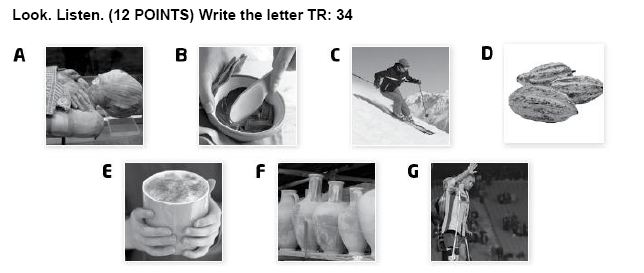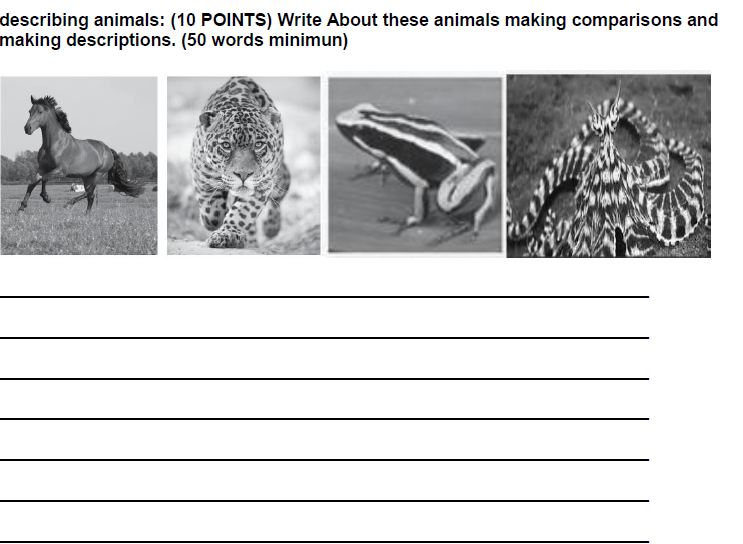martes, 5 de diciembre de 2017
martes, 28 de noviembre de 2017
viernes, 24 de noviembre de 2017
tips para evaluacion 2 grado 5°
Dear students,
Deben estudiar la unidad 3, acerca de la musica:
Grammar: Present perfect
To make the positive present perfect tense, use:
- 'have' / 'has' + the past participle
- Make the past participle by adding 'ed' to regular verbs (for example, 'play' becomes 'played')
- There are a few verbs that change their spelling when you add 'ed' (for example, 'study' becomes 'studied')
- We also have some completely irregular verbs
| Positive | Positive Short Form | ||||||||||||||||||||||||
| I have played | I've played | ||||||||||||||||||||||||
| you have worked | you've worked | ||||||||||||||||||||||||
| he has written | he's written | ||||||||||||||||||||||||
| she has walked | she's walked | ||||||||||||||||||||||||
| it has rained | it's rained | ||||||||||||||||||||||||
| we have travelled | we've travelled | ||||||||||||||||||||||||
| they have studied
The negative is really simple too. Just put 'not' after 'have' or 'has':
| they've studied |
miércoles, 22 de noviembre de 2017
tips para el examen grado 4° nov 23 2017
Queridos estudiantes,
Deben estudiar el vocabulario de la unidad 3, reforzar el tiempo pasado y el uso de instead y de but. Tambien recuerden los ejercicios que hicimos de OMPARACIONES:
MORE BEAUTIFUL THAN....
Deben estudiar el vocabulario de la unidad 3, reforzar el tiempo pasado y el uso de instead y de but. Tambien recuerden los ejercicios que hicimos de OMPARACIONES:
MORE BEAUTIFUL THAN....
Rewrite these sentences, with “instead” at the end of the sentence.
1. I usually download songs instead of buying the CDs.
_______________________________________________________________
2. I walked to work rather than driving today.
_______________________________________________________________
73. Mary decided to give her money to charity instead of buying a new video game.
_______________________________________________________________
_______________________________________________________________
4. Jake will go to graduate school rather than getting a job.
_______________________________________________________________
5. I think I will drink tea today instead of coffee.
_______________________________________________________________
tips para grado 6° Evaluation nov 23 2017
Queridos estudiantes,
En estos links les estoy enviando ejercicios para que practiquen ya que el tema es del so that...
PRACTICA EJERCICIOS CON SO..THAT DANDO CLICK AQUI
VOCABULARY:

Estudia la unidad 3 acerca del chocolate y los dos grammar points:
I got home. The children did their homework.
and
The children did their homework when I got home.
As I was watching television the telephone rang.
This use of the past continuous is very common at the beginning of a story:
En estos links les estoy enviando ejercicios para que practiquen ya que el tema es del so that...
PRACTICA EJERCICIOS CON SO..THAT DANDO CLICK AQUI
VOCABULARY:

Estudia la unidad 3 acerca del chocolate y los dos grammar points:
The past continuous is formed from the past tense of be with the -ing form of the verb:
We use the past continuous to talk about the past:
- for something which continued before and after another action:
The children were doing their homework when I got home.
Compare:
I got home. The children did their homework.
and
The children did their homework when I got home.
As I was watching television the telephone rang.
This use of the past continuous is very common at the beginning of a story:
The other day I was waiting for a bus when …
Last week as I was driving to work …
Last week as I was driving to work …
- for something that happened before and after a particular time:
It was eight o’clock. I was writing a letter.
Compare:
At eight o’clock I wrote some letters.
Compare:
At eight o’clock I wrote some letters.
In July she was working in McDonald’s.
- .to show that something continued for some time:
My head was aching.
Everyone was shouting.
Everyone was shouting.
- for something that was happening again and again:
I was practising every day, three times a day.
They were meeting secretly after school.
They were always quarrelling.
They were meeting secretly after school.
They were always quarrelling.
- with verbs which show change or growth:
The children were growing up quickly.
Her English was improving.
My hair was going grey.
The town was changing quickly.
Her English was improving.
My hair was going grey.
The town was changing quickly.
martes, 21 de noviembre de 2017
Tips para tiempos verbales: Para todos los estudiantes de Calibio
http://blog.openenglish.com/tiempos-verbales-en-ingles/
Los tiempos verbales en inglés expresan el momento en que se realiza una acción (verbo). Determinan si la acción ya fue realizada (pasado), se está realizando (presente) o se va a realizar (futuro).
- El tiempo verbal simple: simplemente muestra cuándo la acción ocurre.
→ Simple Past | Simple Present | Simple Future
- Los tiempos verbales progresivos o continuos: son acciones en vías de realización.
→ Past Progressive | Present Progressive | Future Progressive
- El tiempo verbal perfecto: significa que la acción ha sido completada.
→ Past Perfect | Present Perfect | Future Perfect
- Los tiempos perfectos progresivos o continuos: indican que la acción empezó, continuó y fue completada.
→ Past Perfect Continuous | Present Perfect Continuous | Future Perfect Continuous
Veamos algunos ejemplos de tiempos verbales en inglés de “forma interrogativa” para que los asimiles mejor y puedas ponerlos en práctica correctamente:
TIEMPOS VERBALES PASADOS
| ||
| Tiempo Verbal | Ejemplos en inglés | |
| Past Simple | muestra que la acción ocurrió en el pasado | Did he speak? |
| Past Continuous | muestra que la acción estaba en progreso en algún momento en el pasado | Was he speaking? |
| Past Perfect | muestra que la acción había sido completada antes de algún momento en el pasado | Had he spoken? |
| Past Perfect Continuous | muestra que la acción empezó en el pasado y continuó hasta algún momento en el pasado | Had he been speaking? |
| Conditional Perfect | 1. muestra una acción en el pasado que “tendría que” suceder pero no sucedió por algún otro acontecimiento o circunstancia2. muestra la probabilidad de una acción que ya ha sido completada | Would he have spoken? |
| Conditional Continuous Perfect | muestra una acción que podría haber ocurrido en el pasado | Would he have been speaking? |
TIEMPOS VERBALES PRESENTES
| ||
| Tiempo Verbal | Ejemplos en inglés | |
| Present Simple | muestra que la acción ocurre en el presente | Does he speak? |
| Present Continuous | muestra que la acción está en progreso en el presente | Is he speaking? |
| Present Perfect | muestra que la acción fue completada antes del presente | Has he spoken? |
| Present Perfect Continuous | muestra que la acción empezó en el pasado y continuó hasta el presente | Has he been speaking? |
| Conditional Simple | muestra acciones que posiblemente podrían llevarse a cabo, así como para las solicitudes de cortesía y expresar deseos | Would he speak? |
| Conditional Continuo | muestra que posiblemente la acción tendría continuidad | Would he be speaking? |
TIEMPOS VERBALES FUTUROS
| ||
| Tiempo Verbal | Ejemplos en inglés | |
| Future Simple | muestra que la acción ocurrirá en el futuro | Will he speak? |
| Future Continuous | muestra que la acción estará en progreso en algún momento en el futuro | Will he be speaking? |
| Future Perfect | muestra que la acción será completada antes de algún momento en el futuro | Will he have spoken? |
| Future Perfect Continuous | muestra que la acción continuará hasta algún momento en el futuro | Will he have been speaking? |
| Future going to | muestra que la acción ocurrirá en el futuro (con mayor certeza) | Is he going to speak? |
Que puedas aprender inglés de una manera diferente y divertida es uno de los principales propósitos de Open English y las diferentes herramientas de ayuda que encuentras en hello.blog hacen parte de ello.
Sumérgete en el mundo del idioma inglés
web sites para practicar inglés
La Mansión del Inglés
dá click en el link y aprende inglés de forma fácil
La Mansión del Inglés

dá click en el link y aprende inglés de forma fácil
La Mansión del Inglés
We’ve done the surfing for you!
Whether you’ve passed your IELTS or TOEFL with great marks or are studying for them these websites will help you. Improving or learning is always more productive if you don’t need to spend hours surfing to find the best websites.
The BBC offers many great resources for English language students and their Learning English website http://www.bbc.co.uk/worldservice/learningenglish is a great place to start. It includes many different resources for students including Words in the News which features recent news reports that you can listen to and read with key vocabulary being highlighted. There are quizzes you can do, Phrase of the Day, pronunciation help, grammar and topic related vocabulary; in fact there’s just about everything that an English student will need.

“Phrase of the Day”
For students with an interest in Business English a visit to the Business English Pod website http://www.youtube.com/user/bizpodcould be beneficial. This site has YouTube videos which focus on Business English vocabulary – it’s a great self-study resource as you can find resources for many different aspects of Business English.
English Page http://www.englishpage.com/listening/ gives links to listening material from the BBC and American National Public Radio programmes on various topics. You can access talk shows, drama, news reports, sports, music and many other areas; there should be something to interest everyone. You can choose to listen to British English or American English programmes.
At Dave’s ESL Café http://www.eslcafe.com/ in Student’s Stuff you will find many resources to help you including every student’s favourite phrasal verbs, slang and grammar tips. You can also engage in the forum with other English language students and practise your English by joining in with one of the many discussions.
The Learn English Site from the British Council http://learnenglish.britishcouncil.org/en/ is another great site for English learners. There are downloadable podcasts, games, academic writing help and an IELTS section. You can also download free apps for your iPhone or iPad.
ESLpoint.com www.eslpoint.com offers graded help in all the skills. There are many online practice exercises with clear explanations. There is also a TOEFL/TOEIC section with online material and quizzes. PLEASE NOTE on 3rd January 2017 this site was found to be under construction. Hopefully it will be back online soon.
If you’re studying for any of the Cambridge exams including FCE, Cambridge Advanced and Proficiency, Flo-Joe www.flo-joe.comis a great resource. They provide practice tests in all the papers from Listening to Reading. They also have a new resource for IELTS Speaking which gives free weekly practice tests in the types of topics that are likely to come up in the exam and also weekly vocab tests.
Now you can spend the time you would have spent searching for these websites improving your English. Good luck!
tomado de http://www.i-studentglobal.com
tomado de http://www.i-studentglobal.com
Publicado por Walter Junior Guevara
miércoles, 8 de noviembre de 2017
lunes, 6 de noviembre de 2017
lunes, 30 de octubre de 2017
miércoles, 25 de octubre de 2017
martes, 24 de octubre de 2017
jueves, 19 de octubre de 2017
Suscribirse a:
Comentarios (Atom)




















































